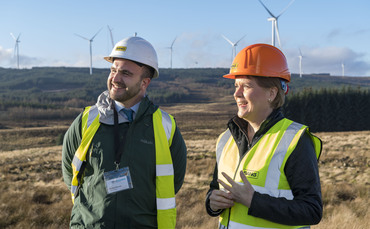

National Grid ESO confirms that on December 30th UK wind power generation hit a record peak of 20.9GW
Blustery weather conditions helped ensure the UK set yet another wind power generation record over the New Year period, according to data from grid operator National Grid ESO.
On Friday 30th December, the UK's fleet of wind turbines generated 20.918GW of electricity in the half-hour period between 6 and 6.30pm, beating the previous record of 20.896GW set on the 2nd November. The peak represented the third time the generation record was broken during 2022.
National Grid ESO also announced that a new record was set on the same day for the percentage of low-carbon electricity delivered by renewables and nuclear assets for a half-hour period, with clean power meeting 87.2 per cent of demand. Overall, wind provided 61.4 per cent of Britain's electricity last Friday.
Dan McGrail, CEO at trade body RenewableUK, hailed the records as further evidence of renewables critical role in bolstering UK energy security and tackling soaring gas power prices.
"The fact that the UK's onshore and offshore wind farms keep setting new electricity generation records shows just how important this technology has become in our modern energy system," he said. "Wind power is playing a central role in keeping UK homes and businesses powered up at the coldest time of the year.
"Wind is now the UK's cheapest source of new power, so every unit of electricity we generate from it helps consumers by reducing ultra-expensive gas imports. Investing in more wind and other renewables is vital in tackling the cost of living crisis for hard-pressed bill payers.
"It's great to see that we've also set a new record of nearly 90 per cent of our electricity generated by low carbon sources, as it demonstrates the enormous amount of progress which the UK has made in moving away from fossil fuels, getting us closer to our net zero goal".
The records came as the Energy and Climate Intelligence Unit (ECIU) think tank provided a new snap analysis, showing how between the 1st of October and the 30th of December, renewables meant the UK was able to avoid buying and burning 56TWh worth of fossil gas - savings equivalent to importing an additional 64 LNG tankers of gas from overseas.
A separate analysis from Imperial College London commissioned by energy giant Drax, which was released yesterday, found that over 2022 as a whole renewable energy sources generated a record 40 per cent of Britain's electricity, an increase of more than a third compared to 2021. The data also showed that overall generation from renewables has more than quadrupled over the past decade.
It calculated that the rise in greener sources of energy generation in Britain last year helped to cut CO2 emissions from the power sector by as much as 2.7 million tonnes compared to 2021.
And in further industry news, Banks Renewables today announced it had installed its 100th onshore wind turbine. The County Durham-based firm confirmed it had reached the landmark at the site of its Kype Muir Extension Wind Farm, a 15-turbine scheme in South Lanarkshire which is due to begin generating clean energy early in the coming weeks.
To mark the milestone, Scottish First Minister Nicola Sturgeon visited the site and hailed the contribution onshore wind farms are making to Scotland's economy. "Onshore wind is the biggest source of renewable energy in Scotland, making it a vital part of our mission to become a net zero economy by 2045," she said. "In addition to being a cheap and reliable source of electricity that harnesses one of our most abundant resources, onshore wind can also help us meet that target in a way that benefits communities - through the creation of high-quality jobs, and investment in local businesses and supply chains - as part of a just transition from fossil fuels to renewable energy."
The visit came after Sturgeon also hinted that the Scottish government's upcoming energy strategy could deliver a major boost to the country's solar sector.
"Energy that is generated from solar can, without a shadow of a doubt, make a very significant contribution to both the decarbonisation of our energy supply and the just transition that we need to make to a net zero emissions society by 2045," she said on the floor of the Scottish Parliament on 22 December in response to a question on the forthcoming new energy strategy from Fergus Ewing MSP.
Sturgeon stopped short of committing to the 4GW to 6GW by 2030 target the solar industry is seeking, but she noted that "stretching and deliverable" targets were important in driving deployment and in boosting the supply chain.
* This article was originally published here
Comments
Post a Comment